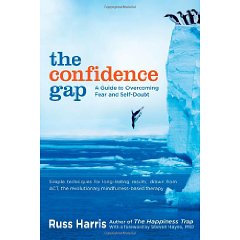The Confidence Gap by Russ Harris
I have recommended this book to clients more than any other. In it, Russ Harris addresses the question of what to do with our thoughts. And since so many folks who come to therapy are plagued with worrisome, negative, or self-condemning thoughts, I wind up talking about the principles from this book all the time!
Russ Harris, a therapist and practitioner of Acceptance and Commitment Therapy, tackles this important topic through the subject of confidence. He suggests that most people want to feel confident so that they can do all the things they wish. He turns this desire on its ear by suggesting that the feeling of confidence is not found by having a conversation in a therapist’s office. Confidence only comes as people do the things they wish they could, succeed and fail, interpret and learn. Confidence will develop only after that. So, Harris tackles the notion of doing stuff while feeling a clear lack of confidence. That’s where thought work comes in.
Even if your starting point is not the issue of confidence, this book is helpful to anyone who is sick and tired of the story playing in his or her heads. Those fretful, judgmental, or defeatist thoughts are very difficult, if not impossible, to abolish. So, what does one do with them? Harris teaches a concept I bring to session regularly– thought defusion. Every person could use teaching about how to treat thoughts.
Here is a selection of my favorite of his main teaching points:
- The action of confidence comes first; the feelings of confidence come later.
- Genuine confidence is not the absence of fear; it is a transformed relationship with fear.
- Negative thoughts are normal. Don’t fight them; defuse them.
- Don’t obsess about the outcome. Get passionate about the process.
- Don’t fight your fear; allow it, befriend it, and channel it.
- Failure hurts—but if we’re willing to learn, it’s a wonderful teacher.
(All of these points are found on p. 246 of Harris’ book.)
Harris’ book has several exercises along the way and his writing style is clear and practical. He could be accused of being a little peppy, in the spirit of self-help authors, but the wisdom of his message comes through clearly. His practical style challenges the reader to actually engage the material, so the possibility of a true-life change is greater.
You can find the book at the library, or purchase a copy by clicking HERE

